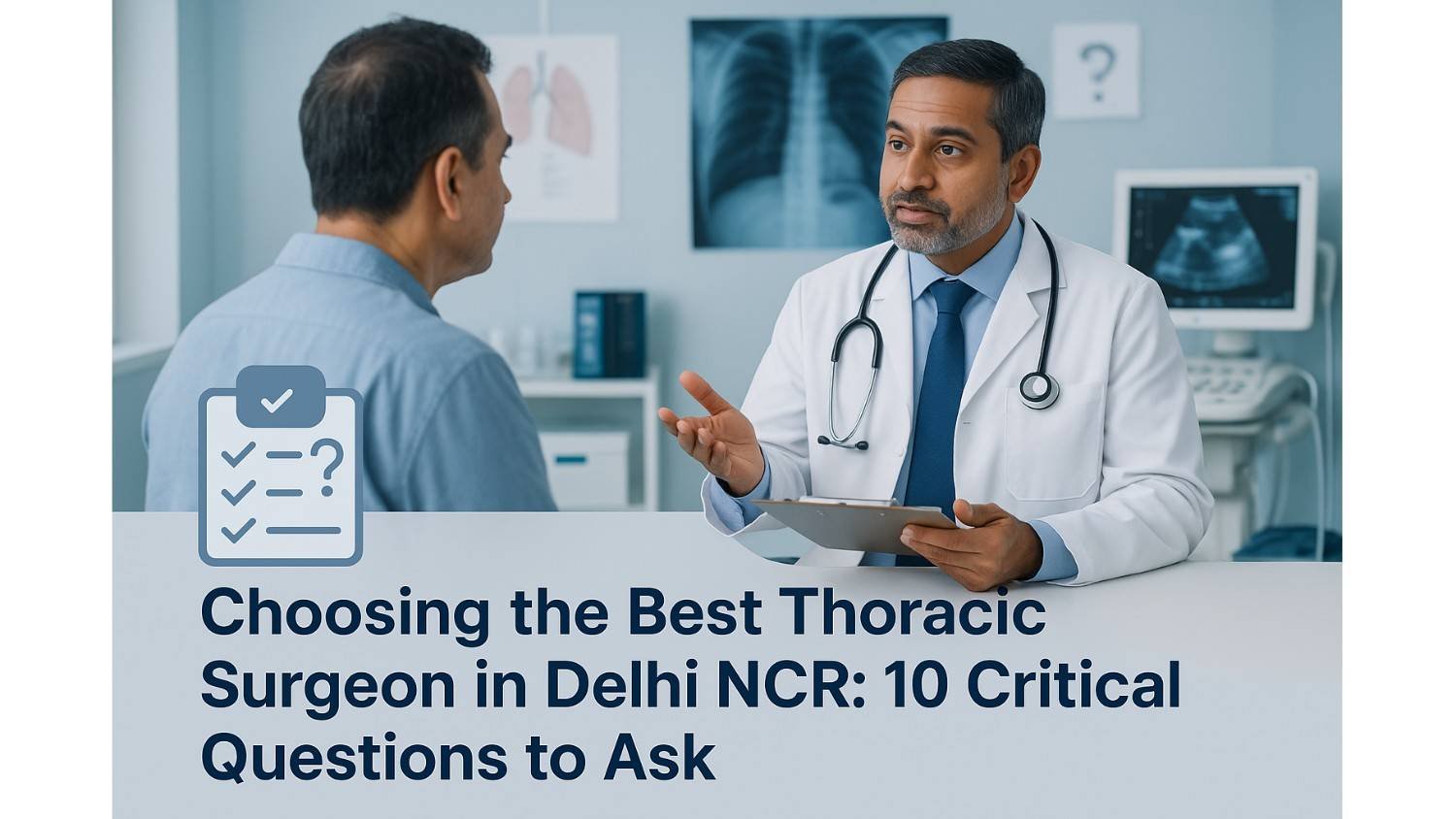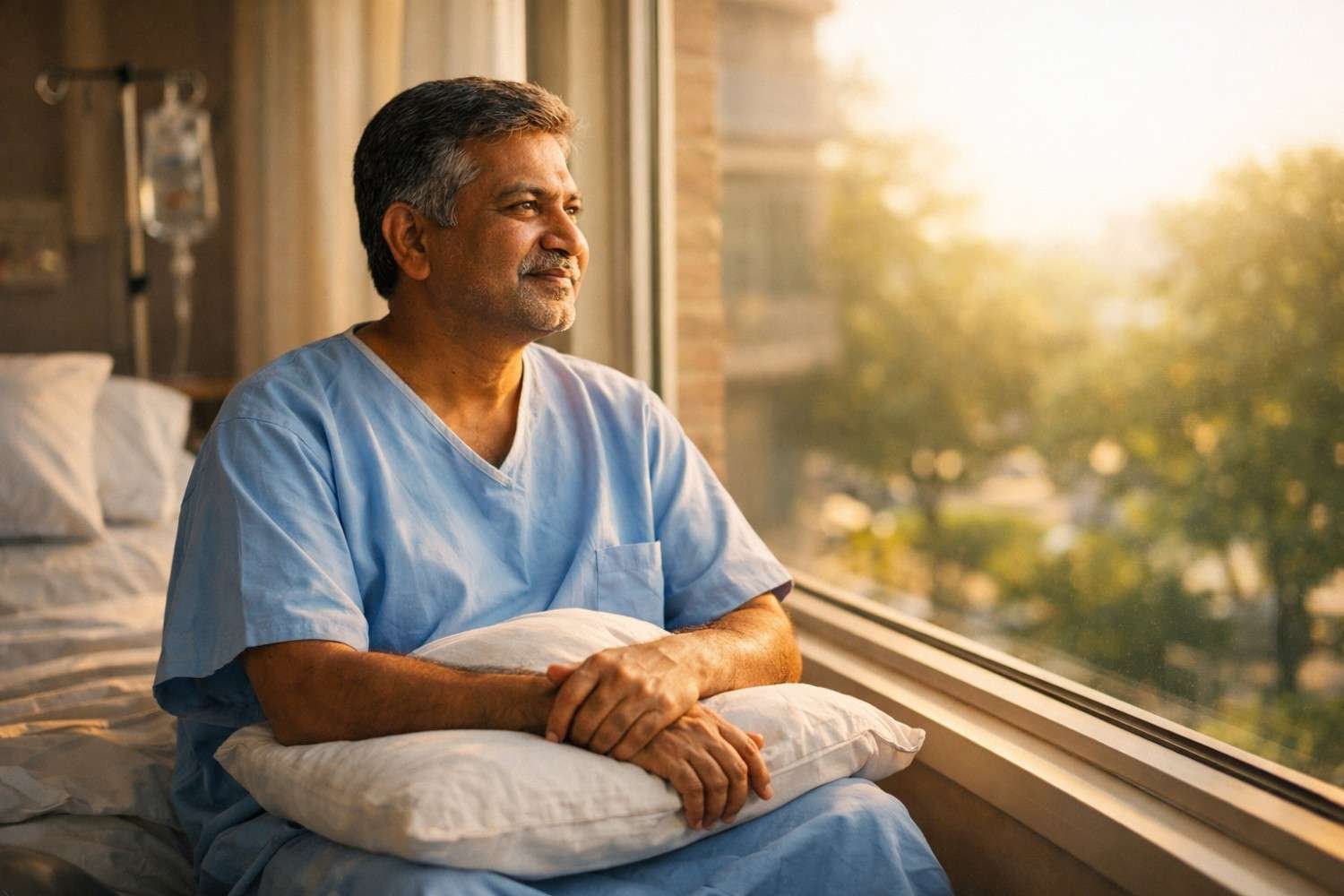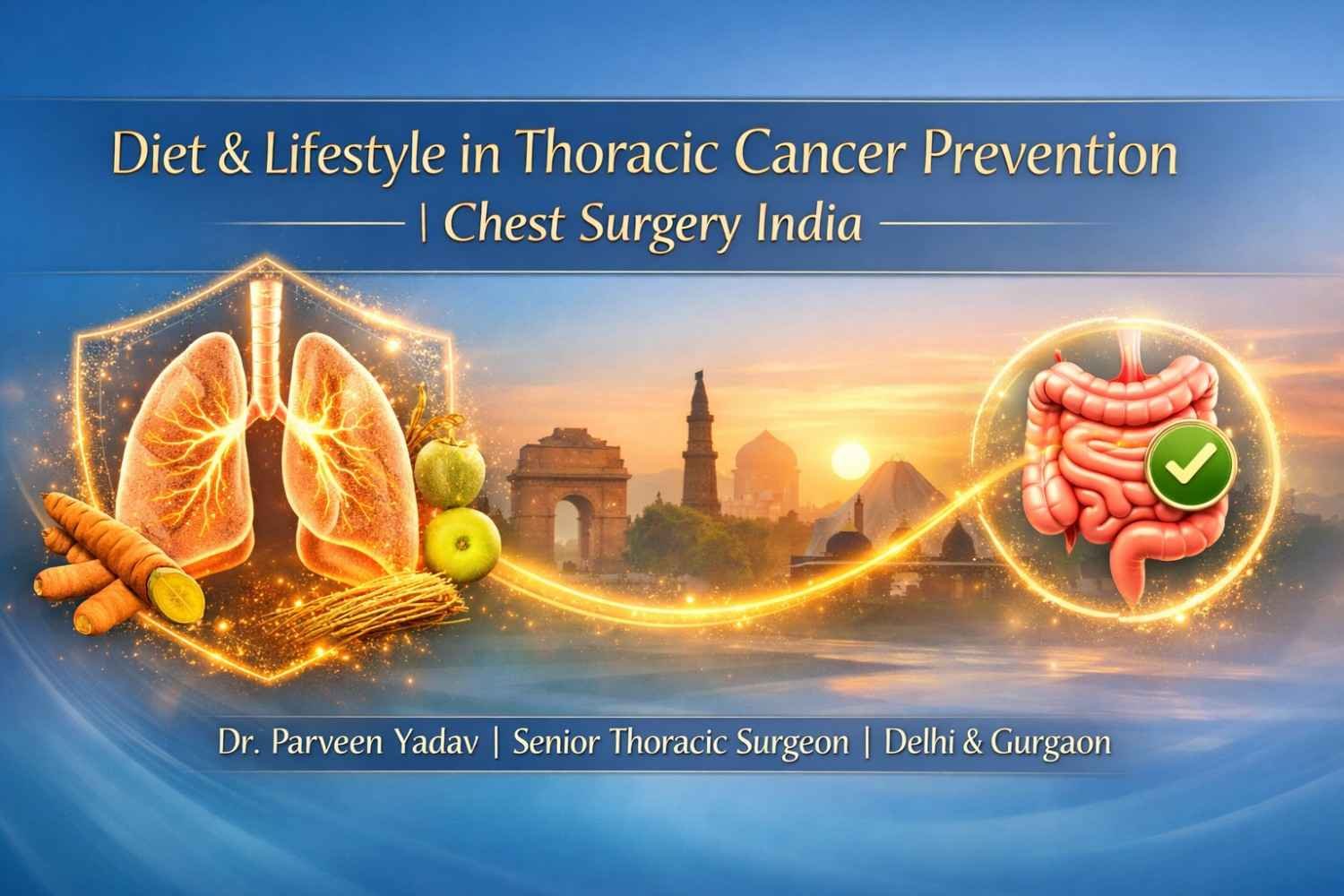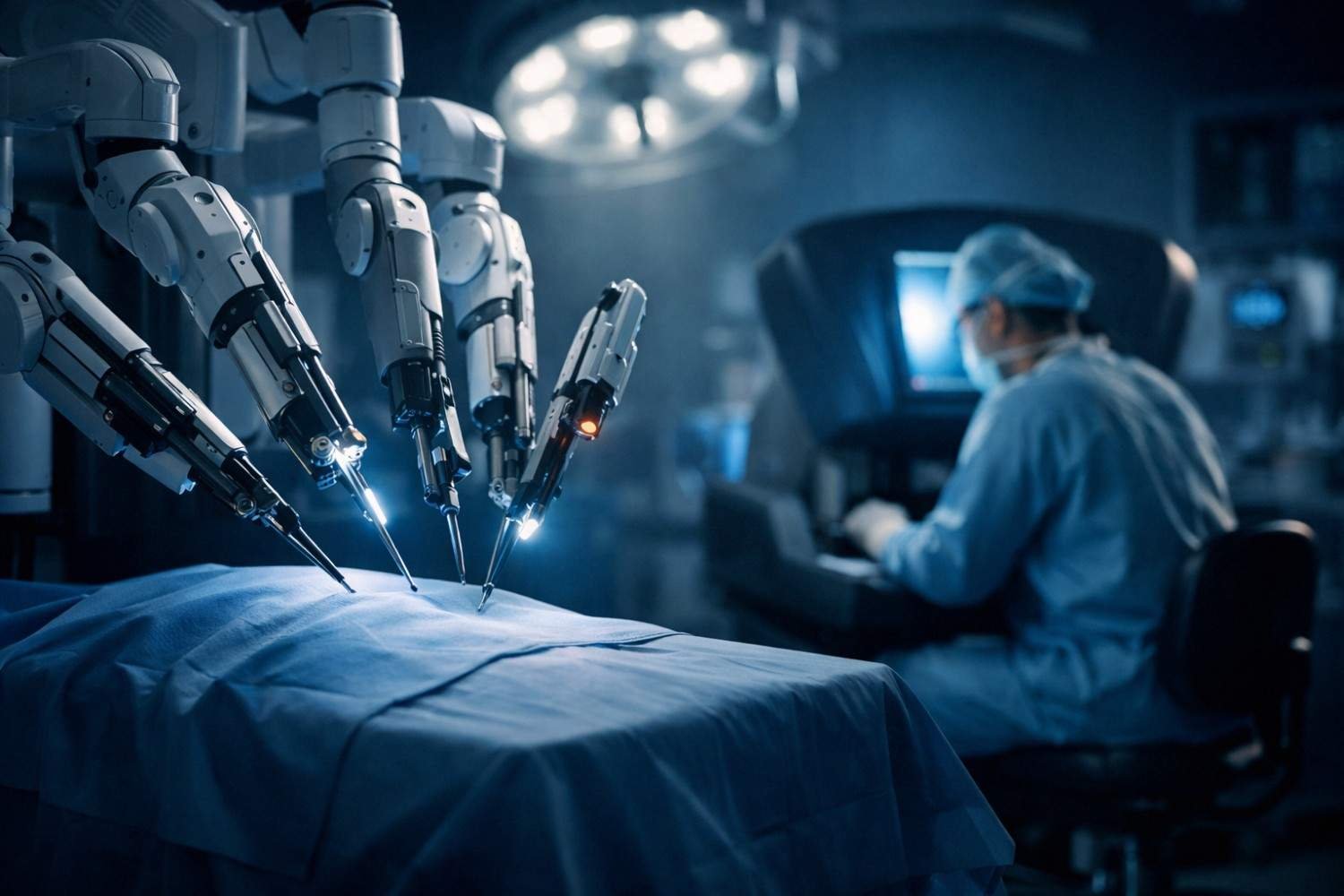

Hello, I'm Dr. Parveen Yadav. With over 18 years of experience in thoracic surgical oncology, I have had the privilege of guiding more than 2,500 patients and their families through one of the most challenging journeys of their lives. I understand that a diagnosis requiring chest surgery—whether for lung cancer, esophageal cancer, or another complex condition—is overwhelming. The path ahead can seem uncertain, and the most important decision you will make is choosing the right surgeon to navigate it with you.
This isn't just about finding a doctor with a good degree. It's about finding a partner in your care—a specialist whose expertise, judgment, and approach align perfectly with your specific needs. The proper choice can significantly impact your outcome, your recovery, and your peace of mind.
To empower you in this critical process, I have compiled this comprehensive guide. Think of it not as a brochure for my services, but as a roadmap to assist you ask the right questions, understand the solutions, and make a confident, informed decision. This is the conversation I would want my own family member to have.
Thoracic surgery is one of the most complex and delicate fields in medicine. The chest cavity, or thorax, houses our most vital organs: the heart and the lungs. Operating in this area requires immense precision, advanced technical skill, and a profound understanding of how these systems work together.
When cancer is involved, the complexity multiplies. This is where the sub-specialty of thoracic surgical oncology becomes crucial. A surgical oncologist doesn't just remove a tumour; they understand the behaviour of cancer. They perform surgery with the goal of achieving "clear margins"—removing the entire cancer while preserving as much healthy organ function as possible—which is a cornerstone of providing the best chance for a cure.
In a city like Delhi, you have many options. But in a field this specialized, the difference between a good surgeon and the right surgeon for you can be profound.
For decades, thoracic surgery meant a long incision, spreading the ribs, significant post-operative pain, and a long, arduous recovery. Thankfully, medical advancements have given us a much better way: Minimally Invasive Thoracic Surgery, or MITS.
MITS includes techniques like Video-Assisted Thoracic Surgery (VATS) and da Vinci Robotic-Assisted Surgery. Instead of a large opening, we use a few small keyhole incisions. A tiny high-definition camera provides a magnified, 3D view of the operating area, and we use highly specialized instruments to perform the surgery with incredible precision.
As a Da Vinci certified robotic surgeon, I have seen firsthand how these technologies transform patient outcomes. The benefits are not just theoretical; they are real and life-changing.
| Feature | Traditional Open Thoracotomy | Minimally Invasive Surgery (VATS/Robotic) |
| Incision | 6-10 inch long incision | 3-4 small keyhole incisions (less than 1 inch) |
| Rib Spreading | Yes, required to access the chest | No rib spreading is necessary |
| Post-Operative Pain | Significant, often requiring strong pain medication for an extended period | Substantially less pain, managed with milder medication |
| Hospital Stay | Typically 7-14 days | Typically 3-5 days |
| Recovery Time | 6-8 weeks or more to return to normal activities | 2-3 weeks to return to most normal activities |
| Scarring | Large, prominent scar | Minimal, less noticeable scarring |
| Blood Loss | Higher potential for blood loss | Minimal blood loss |
| Risk of Complication | Higher risk of infection and pneumonia | Lower risk of post-operative complications |
The evidence is clear. For eligible patients, MITS is the superior approach, offering a faster, safer, and less painful recovery. This is why one of the most important questions you can ask revolves around a surgeon's proficiency in these advanced techniques.
Now, let's get to the core of your consultation. Here are the ten questions you should ask any surgeon you are considering. I have also included insights into why each question is critical and what a reassuring answer sounds like.
Why This Question Matters: Experience is not just about the number of years a surgeon has been practicing. In a complex field like thoracic oncology, what truly matters is focused experience. A surgeon who has performed thousands of general surgeries is not the same as a surgeon who has performed thousands of lung or esophageal cancer surgeries. High volume in a specific, complex procedure is directly linked to better patient outcomes.
What a Good Answer Looks Like: A confident surgeon should be able to provide specific numbers without hesitation. They should talk about their experience with your exact diagnosis and the specific operation you need. Vague answers like "I've done many of these" are not enough.
For example, in my own practice, I have focused exclusively on thoracic oncology. This has allowed me to perform over 1,000 major surgeries for lung cancer and another 1,000 for esophageal cancer. This depth of experience in a narrow field allows for a level of mastery that is essential for tackling complex cases.
Why This Question Matters: As we've discussed, MITS is now the standard of care for many thoracic conditions. A surgeon who is truly an expert in MITS will use it for the vast majority of their cases, not just a select few. This question helps you gauge whether the surgeon is a true specialist in modern techniques or someone who only occasionally performs them.
What a Good Answer Looks Like: The answer should be a high percentage, often upwards of 90% for common procedures in experienced hands. The surgeon should express confidence in using a minimally invasive approach for your specific case and be able to clearly explain why if, in a rare instance, an open approach is necessary. As a certified robotic surgeon, I believe in leveraging this technology to provide the safest and most effective treatment for nearly all my patients.
Why This Is the Toughest—and Most Important—Question to Ask: This can feel like an uncomfortable question, but it is your absolute right to ask it. Every surgery has risks, and any surgeon who claims 0% complications is not being truthful. An experienced and transparent surgeon will know their numbers—their success rates, infection rates, and rates of other potential complications—and will be willing to discuss them openly.
What a Good Answer Looks Like: The surgeon should be able to discuss their outcomes frankly. They might compare their rates to national or international benchmarks. Their willingness to have this conversation is a powerful indicator of transparency and confidence in their results. It shows they are committed to patient safety and are constantly tracking their performance to ensure the highest quality of care.
Why This Question Matters: The best surgeon in the world cannot deliver the best results without a world-class team and facility. The hospital is a critical part of your care equation. You need an institution with a dedicated oncology department, state-of-the-art equipment, and, most importantly, an experienced Intensive Care Unit (ICU) that specializes in post-thoracic surgery care.
What a Good Answer Looks Like: The surgeon should be proud of their hospital affiliation. They should mention things like NABH or JCI accreditation, which are marks of the highest quality standards. They should speak of the hospital's multidisciplinary team—the medical oncologists, radiation oncologists, pulmonologists, and specialized nurses who will be part of your care. I operate out of Artemis Hospital, Gurugram, a leading multi-specialty institution known for its excellence in patient care and state-of-the-art medical technology.
Why This Question Matters: Surgery is a team sport. Your surgeon is the captain, but their success depends on a skilled and coordinated team. This includes the anesthesiologist in the operating room, the junior doctors, the physiotherapists who help you recover your lung function, and the nurses who care for you around the clock.
What a Good Answer Looks Like: The surgeon should be able to describe the team that supports them. They should give you confidence that you will be cared for by a group of dedicated professionals at every step. I am fortunate to work with an incredible team, including my trusted colleagues Dr. Vikas and Shabana, who ensure every aspect of our patients' care is managed seamlessly.
Why This Question Matters: A truly great surgeon is not just a technician; they are a strategist. They should be able to discuss all available treatment options, including non-surgical paths like chemotherapy or radiation, or less invasive procedures if applicable. This shows they are focused on the best outcome for you, not just on performing a surgery.
What a Good Answer Looks Like: The surgeon should provide a balanced overview of all your options, clarifying the pros and cons of each. They should make you feel like a partner in the decision-making process. They should also be supportive of you seeking a second opinion; in fact, most confident surgeons encourage it.
Why This Question Matters: The surgery itself is just one day. Your recovery is a journey of weeks or months. Understanding what to expect is vital for your physical and mental preparation. This question helps you look beyond the operating room and plan for your life post-surgery.
What a Good Answer Looks Like: The surgeon should be able to give you a clear and realistic timeline. How many days will I be in the hospital? When will the chest tube be removed? How will my pain be managed? When can I expect to return to work or daily activities? A good surgeon sets realistic expectations and provides a clear plan for post-operative care, including pain management and physiotherapy.
Why This Question Matters: A medical diagnosis is a family diagnosis. The stress and anxiety are shared. The best surgical teams understand this and have systems in place to communicate clearly and provide support not just to the patient, but to their loved ones as well.
What a Good Answer Looks Like: The surgeon should explain how their office communicates with patients. Is there a dedicated coordinator? How can you reach them with questions after hours? Their answer should give you a sense of comfort and accessibility. Reading patient testimonials can also provide powerful insight into a surgeon's communication style and compassionate care. My team and I are available to our patients around the clock because we know that questions and concerns don't follow a 9-to-5 schedule.
Why This Question Matters: A surgeon who teaches or participates in academic research is a surgeon who is at the forefront of their field. They are not just applying today's standards; they are helping to create tomorrow's. This commitment to advancing the field is often a sign of a true expert who is deeply passionate about their specialty.
What a Good Answer Looks Like: Look for involvement in medical societies, presentations at national or international conferences, or publications in medical journals. This demonstrates a dedication to lifelong learning and a desire to contribute to the broader medical community, which ultimately benefits their patients. My own participation in international conferences ensures that I am always bringing the latest global standards and techniques back to my patients in Delhi.
Why This Question Matters: Facing a serious medical issue is stressful enough without the added burden of financial and logistical uncertainty. A patient-centric practice will have a transparent process for explaining costs and will provide support to assist you navigate the complexities of insurance approvals.
What a Good Answer Looks Like: The surgeon's office should be able to provide a clear estimate of the costs for the surgery and hospital stay. They should have a team member who can help you with insurance paperwork and pre-authorizations. For out-of-town or international patients, a top-tier practice will offer assistance with travel and accommodation, providing true end-to-end support.
To make things easier, here is a simple checklist you can take with you to your appointments.
| Category | Question | Notes |
| Experience | What is your specific experience with my condition and surgery (number of procedures)? | |
| Technique | What percentage of these are done with MITS (VATS/Robotic)? Am I a candidate? | |
| Outcomes | Can you discuss your personal complication and success rates for this procedure? | |
| Facility | Which hospital will you use? What are its credentials in thoracic oncology? | |
| Team | Who else will be on my care team before, during, and after surgery? | |
| Options | What are the alternatives to this surgery? Should I get a second opinion? | |
| Recovery | What does the typical recovery timeline and process look like? | |
| Support | How does your team communicate with and support patients and families? | |
| Academics | Are you involved in teaching, research, or academic conferences? | |
| Logistics | Can you explain the costs and provide assistance with insurance/logistics? |
Picking a surgeon is a deeply personal decision. After you have gathered all the facts and figures, the final choice often comes down to trust and connection. Do you feel heard? Does the surgeon inspire confidence? Do you feel like they see you as a person, not just a medical case?
My philosophy of care is built on a partnership. My role is to provide you with the highest level of surgical skill, honed by years of dedicated focus on thoracic oncology. But it is also to be your guide, your advocate, and your source of clarity in a confusing time. I am committed to answering every one of these questions for you, openly and honestly.
Your health is too important for anything less.
Ready to have this conversation? I invite you to schedule a consultation to discuss your case and get the answers you deserve.

18+ Yrs Exp | 5,700+ Thoracic & Robotic Cancer Surgeries
Dr. Parveen Yadav is a Director and Senior Consultant in Thoracic and Surgical Oncology, specializing in minimally invasive and robotic lung and esophageal surgeries, with advanced training from AIIMS and Tata Memorial Hospital.
View Full Profile Pain After Thoracic Surgery: Tips for Smooth Recovery
Pain After Thoracic Surgery: Tips for Smooth Recovery
 Diet & Lifestyle for Thoracic Cancer Prevention | Dr. Parveen Yadav
Diet & Lifestyle for Thoracic Cancer Prevention | Dr. Parveen Yadav
 Robotic Thoracic Surgery: How Da Vinci Technology is Revolutionizing Chest Procedures
Robotic Thoracic Surgery: How Da Vinci Technology is Revolutionizing Chest Procedures
Struggling with pain after chest surgery? Dr. Parveen Yadav shares expert recovery tips, causes of shoulder pain, PTPS signs, and what your discharge sheet won't tell you.
Discover how diet, breathing exercises & daily habits help prevent and recover from thoracic cancer. Expert insights from Dr. Parveen Yadav, Chest Surgery India
Discover how Da Vinci robotic surgery is transforming chest procedures in Gurgaon. Less pain, faster recovery & expert care by a certified thoracic surgeon
Copyright 2026 © Dr .Parveen Yadav all rights reserved.
Proudly Scaled by Public Media Solution!